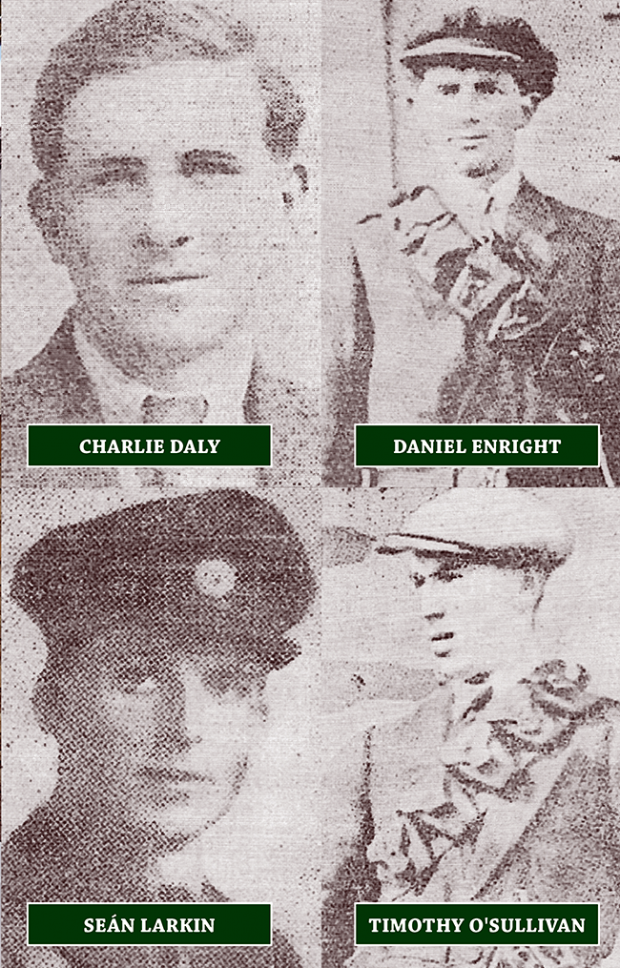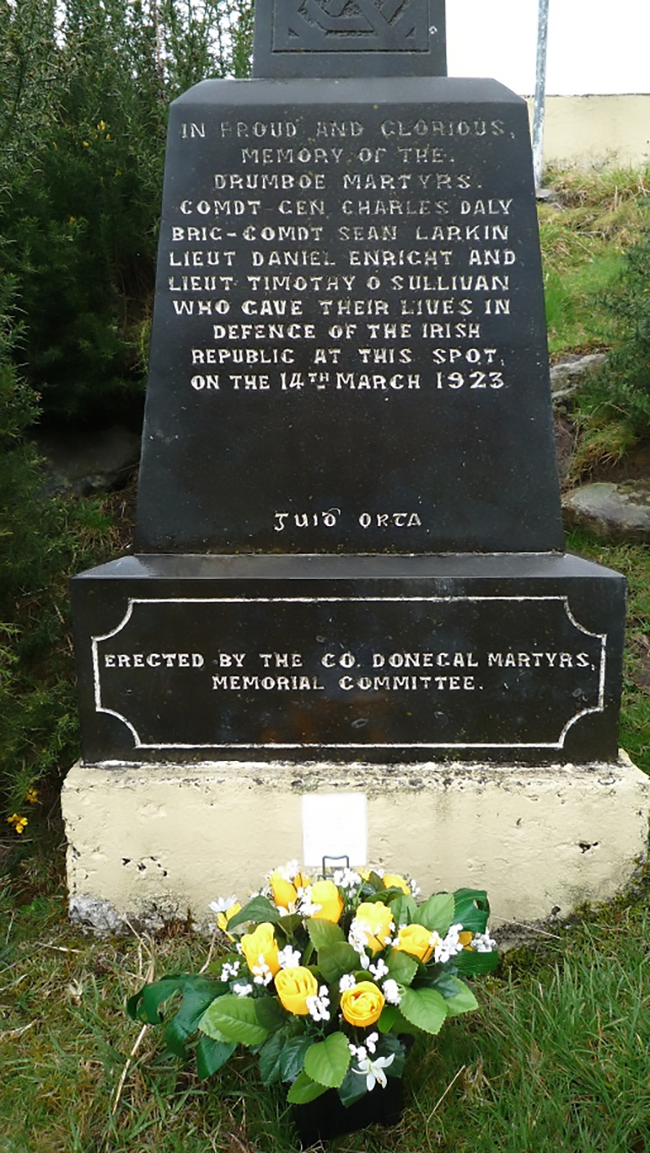12 March 2023
Centenary of the Drumboe Martyrs
Remembering the Past

November 1922 saw a general sweep by Free Staters through Donegal in an effort to end Republican opposition in the county. This sweep was successful in that it captured the vast bulk of Volunteers operating in the county or forced them to go on the run in other counties.
Amongst those captured were the remnants of Charlie Daly's column (2nd Northern Division) which had been engaging both the Staters and the Crown Forces since May 1922.
Daly, a native of Firies, County Kerry, joined the Irish Volunteers in 1914 and as Adjutant of the Firies IRA Battalion he took part in many successful attacks on RIC barracks in County Kerry in the early years of the Tan War, and was also a member of Kerry County Council.
In September 1920 he travelled north on Cathal Brugha's order to organise the IRA in counties Tyrone and Derry. From the time of his arrival the local units became more daring and active in the struggle. He organised the first daylight attack on an RIC barracks during the Tan War. Drumquin barracks was taken and a large haul of arms captured. The local RIC sergeant was also killed in the attack.
Before being arrested and interned in Collinstown Camp, County Dublin, in January 1921 he appointed a County Derry man, Seán Larkin, as Brigade Adjutant. Larkin had joined the Volunteers in 1914 and was arrested in 1920. In Mountjoy jail he went on hunger-strike and was released, and reported back for active service.
During the Truce of 1921 Charlie Daly and Seán Larkin reorganised the IRA in the Tyrone/Derry area and implemented an intensive period of training. When on 6 December 1921 the Irish delegation in London accepted the Articles of Agreement (Treaty) Daly and Larkin were among the first to reject its terms.
At Christmas 1922 Charlie returned to Kerry for a short period where he appealed for Volunteers to return north with him to challenge the Orange state. Among those who joined him were Dan Enright and Tim O’Sullivan, experienced Volunteers.
The reorganised IRA launched numerous attacks on the crown forces in the Donegal/Tyrone/Derry border region. May and June 1922 saw serious engagements between the IRA divisions and crown forces at Pettigo-Belleek, Clady, Strabane and Lifford.
With the outbreak of open hostilities between the Free State and the IRA Charlie Daly tried to halt the spread of the conflict and appealed to the Staters in County Donegal to join in the unfinished work of establishing a united Ireland, and the immediate task of protecting nationalists in the new Orange state from sectarian pograms. His appeals fell on deaf ears and on 28 June Free State attacked Republican positions in County Donegal.

The IRA responded with attacks in East Donegal at Manorcunningham, Drumkeen, Castlefin and Lifford before being forced to retreat further into the county. Daly reported to HQ soon after:
“We had something over 100 men at the start, some of them were spies and traitors. In the course of a few weeks we were left with only 30 men and nearly all of them were strangers to the county.”
He also outlined the harsh conditions which his and other IRA columns operated under during the Civil War:
“The country is so assuredly poor that we could hardly get enough to eat. We are often glad when we get potatoes and salt, or a bit of bread and a drop of tea, no matter what side their sympathies were with, they were always hospitable.”
The 2 November sweep followed in which Daly, Larkin, Enright and Sullivan were captured at Dunlewy in the shadow of Errigal mountain.
The four were court-martialled in January and on 14 March 1923 they were marched, from Drumboe Castle where they were being held, to an improvised firing range about 30 yards up a gentle sloping field in the nearby woods. They were summarily executed at this spot.
The executions caused outrage in Donegal and across Ireland. It was well noted that three of the four had come from Munster to fight against the Partition of the country. At the same time in their native Kerry, the Free State forces were carrying out some of their worst atrocities.
After the outbreak of the Civil War Charlie Daly had written an appeal to the Volunteers of his Division to stand by the Republic and Irish Unity. He wrote:
“You fully realise that Civil War is now on in Donegal and, unless you seriously examine your relations to it in time, I fear that you will unwillingly be drawn into it - some of your comrades have been already.
“Ask yourselves what has brought on this war, first in the south and now in Donegal. Is it not those people, who besides letting down the Republic by the so-called Treaty, left the six Ulster counties hopelessly and helplessly at the mercy of the Orange specials? Is civil war in Donegal brought about by the man from the south who came north to help you fight the Specials?”
Follow us on Facebook
An Phoblacht on Twitter
Uncomfortable Conversations

An initiative for dialogue
for reconciliation
— — — — — — —
Contributions from key figures in the churches, academia and wider civic society as well as senior republican figures




